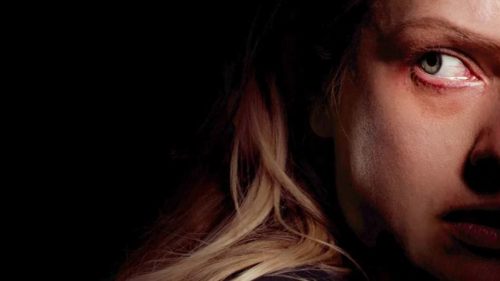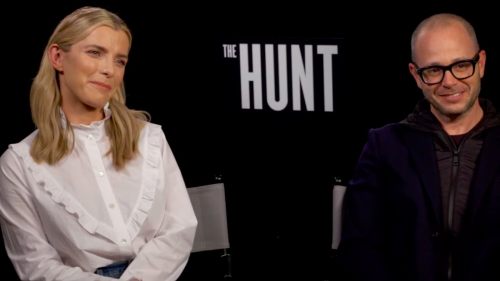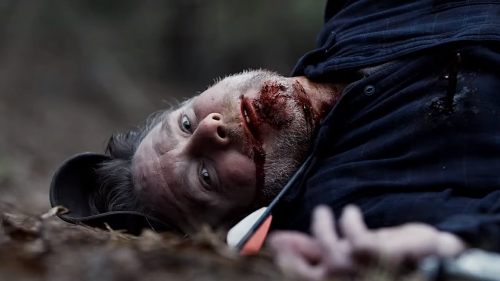Welcome Home: The 39th Telluride Film Festival Recapped
Documentary stalwart Ken Burns begins every Telluride Film Festival by delivering a passionate, off-the-cuff invocation – cheekily referred to as ‘the benediction’ – to the year’s 300+ staff and volunteers. I know this because I have attended the festival in a staff or student capacity for the past five years. Time and time again I have found myself moved by Burns’ offscreen eloquence, but also the universality of this annual sentiment. The 39th Telluride Film Festival was no different. This year’s speech was about returning home. Only a handful of the festival’s staff members are legitimately from Telluride, but for four days in September, everyone who works and attends the festival is a Telluridian. The town boasts an indescribable majesty: a mix of mountains, movies, and nonchalance found nowhere else on the festival circuit. Attending Telluride, you become a part of a whole new festival family, a group of folks whose common bond is a love of the cinema.
It only takes one festival to have Telluride feel like your magical home away from home. Some might already feel this way after Ken Burns speaks, but when director Peter Sellars takes the stage immediately after him, the benediction ends and the celebration begins. In Sellars’ characteristic and catching exuberance, his welcome is foremost an embrace. It is the figurative version of the actual hugs he gives out freely to any festivalgoer with arms outstretched. It simply wouldn’t be a festival without receiving a hug from Peter Sellars. By the end of Peter’s call to action, at the point that he refers to the festival staff as the “mavens of the impossible,” I could already feel the wetness running down my cheeks. I was crying, literally moved to tears by the man’s expression of love for this film festival.
It is Thursday, August 30th, and I wipe away the tears before anyone could notice. The next day, the festival’s notoriously secret feature line-up would be officially announced. It was time to get some sleep, but not before a nightcap at the first of many fest parties.
August 31st:
Rested up and ready to work, friends and colleagues eat breakfast with one another at the festival Clubhouse. Minutes later, everyone is off to work at their appointed locations. At The Backlot, the festival’s most intimate venue at 63 comfy seats, six additional staff members and myself worked tirelessly to present the latest, greatest documentaries to the festival audience. We each reported at 9:00 AM to prepare the space for its first show not only at our venue, but of the entire festival – ‘round about 12:30 PM. Year after year, The Backlot has the distinction of opening the Telluride Film Festival, a truly incredible honor.
At noon, the schedule is released and the buzz begins. Attendees everywhere clamor about what to see and when to see it, making plans so tentative that inevitably every schedule is marked up like some kind of absurdly incomprehensible battle strategy. Some go for quantity, attempting to see the most films possible within the festival’s four days, while others opt for quality, carefully selecting each title based on early reviews or their own intuition. Thankfully, you really can’t go wrong with the Telluride Film Festival’s line-up. You won’t see everything you want, but you’ll always see something interesting. Looking at the schedule for the first time, my first selection was a cinephilic no-brainer. Geoff Dyer, the year’s guest director, had programmed Andrei Tarkovsky’s Stalker in connection with his newest book, Zona: A Book About A Film About a Journey to a Room. An opportunity to see Stalker on 35mm should not be easily dismissed, due in no small part to the rarity of quality Stalker prints. According to Fest Co-Director Tom Luddy’s introductory remarks, the print in question came from a mysterious international source. It was remarkable, a nearly flawless print. Three hours of a mystical Russian classic to start the fest. Tarkovsky, who was a Telluride tributee in 1983, would have surely been proud.
Before Stalker began, I ran into Noah Baumbach (Kicking and Screaming, The Squid and the Whale), who was at the festival with his latest film, Frances Ha. We had met the previous year at the Toronto International Film Festival, when he was attending a screening alongside Brian De Palma. We spoke warmly, but briefly. I expressed my interest in seeing his latest picture; we talked about its distribution plans, and agreed to be in touch throughout the festival and following the film’s tour of the film festival circuit.
Following my conversation with Noah Baumbach and STALKER on 35mm, I enjoyed a quick dinner, and chased it with a beautiful documentary double feature at The Backlot. György Pàlfi’s Final Cut: Ladies and Gentlemen, a meticulously constructed Hungarian portmanteau film was next on the docket. Comprising clips from upwards of 450 feature films, Final Cut is an entirely original love story between a man and a woman that is edited together from what seems the overarching history of the cinema. It is a remarkable achievement and what may be the most sincere love letter ever sent from one film to another (or, better yet, 450 others). Final Cut easily makes my top three. Katriné Boorman’s personal recollection on her father, John Boorman (Excalibur, Zardoz) followed in Me and Me Dad, a loving portrait of the legendary director as a father, husband, and man. It is a sweet and intimate film, born out of the pure love and respect that exists between a daughter and her father. I wish that one (or more) of John Boorman’s films had played the festival as a complement to Katriné’s beautiful portrait, but we can’t always get what we want. Nonetheless, the first day at this year’s festival proved to be a supremely satisfying day of film watching.
Afterward, many festival friends and I met up at The New Sheridan, a favorite town bar. It was packed with people who I mostly did not recognize and who did not seem to be at all associated with the festival. Pushing through the throng, we eventually made it into a clearing; an out-of-the-way section of the establishment with couches surrounding a small coffee table. There we stayed until roughly 2:00 AM, a group of film industry folks drinking, laughing, and catching up with one another. A sudden and surprising bar fight broke out near the end of the evening – we were all witnesses, but not participants. It all happened in less than 10 seconds. The energy in the room changed and moments later the room physically lunged in one direction, a mass of bodies scrambling and biting at one another in a mad dash to express themselves with violence. A glass bottle connected with a man’s skull, resulting in a severe head wound, but otherwise no one walked away injured.
Such occurrences are extremely rare in Telluride. I’ll chalk this one up to out-of-towners.
September 1st:
The next day began with Jack Garfein’s Something Wild (1961) at The Palm, the largest festival venue by far at a whopping 650 seats. As a spotlight on the filmmaker who survived Auschwitz to find success on stage and screen, as well as being an acting teacher, this film was being shown in addition to his earlier picture, The Strange One (1957). Not to be confused with the 1986 Jonathan Demme picture of the same name, Garfein’s Something Wild is a film unlike any other, the story of a young teenage girl (Carroll Baker, also Garfein’s wife) who is unceremoniously raped while walking home from school. The incident destroys everything that she is or could have been. She wanders aimlessly through the New York city streets in search of something she can’t articulate, but needs to find. Closure, security, she needs to resume her life. When a man (Ralph Meeker) pulls her down from a ledge, ostensibly saving her life, the two reluctantly begin a relationship built on the very unnerving foundation of Stockholm syndrome, yet which seems utterly sincere. A film about which much can be said, and all of which is up for debate, Something Wild was a repertory gut-punch, one to be seen again and again as the years go on.
Later on, I saw Mikis Theodorakis, Composer, an unassuming documentary about the man who composed the scores for Zorba the Greek, Serpico, and numerous others. It is a short, sweet, 53-minute film about his life and his work, spoken in his own words. Theodorakis himself appears onscreen, narrating through the many stages of his life, all of which surrounds his undeniable status as one of the 20th century’s most legendary composers. Its main objective is to inform and here it succeeds, but it does not go to any great length to capture the attention of the viewer. You are either in, or you are out. In this regard, even as a fan of Theodorakis’ film work, I felt among those alienated.
The evening carried on and I learned from a friend that Greta Gerwig, star of Noah Baumbach’s Frances Ha, had lost her sunglasses earlier that day while attending a screening at Telluride’s open-air venue, the Abel Gance (named after the great French director). The aforementioned friend had found her sunglasses following the event with the intent to return them. I promised to keep my eyes peeled for her and offered to e-mail her, having her e-mail from a previous college essay on the “mumblecore” neologism. I eventually went to bed at 5:30 AM, after dancing with festival friends for upward of three hours, during which time I may or may not have briefly worn Greta Gerwig’s sunglasses.
September 2nd:
An early call time meant no film watching until late in the day. From 8:00 AM until 2:00 PM, I worked at The Backlot. We continued our tradition of showing great documentaries and I walked away proud at the conclusion of my shift. Back on Main Street, I ran into Greta Gerwig and Noah Baumbach in the local bookstore, informed Greta that a friend of mine had found her sunglasses, and coordinated a meet-up between them both. An hour or so later, the sunglasses were safely returned to their rightful owner and Greta was grateful.
By this time utterly exhausted, I took the afternoon off mostly to nap, do some laundry and meet up with a fellow film programmer, Scott Foundas of the Film Society of Lincoln Center. We met up at Telluride’s coffee shop of choice, The Steaming Bean, to talk about our upcoming programming in NYC and Austin, as well as to share our mutual enthusiasm for the festival selections we had already seen and were still excited to see soon thereafter. It was great to catch up with Scott, who had previously sent me a lovely note when the Alamo Drafthouse Cinema first hired me as a film programmer, back in April of 2012.
45-minutes later, I found myself in line at the Sheridan Opera House to see Love, Marilyn, a brand new documentary on Marilyn Monroe utilizing seemingly random celebrities to embody her words and those of others intrinsic to the telling of her story. On my way in I met Mark Helfrich, the editor of Breakin' (1984) and Predator (1987). Mark noticed that I was wearing a Cannon Films t-shirt and inquired about its origin. This led to a long conversation about his body of work, stories from his time at Cannon and also with Roger Corman’s New World Pictures. My conversation with Mark would be the best and most memorable part of this particular screening. As the lights dimmed, we exchanged contact information and took our seats. Back to Marilyn. Albeit touting the inclusion of newly discovered diary entries or personal writings hidden away from the public for years, Love, Marilyn, in my case, was a love unrequited. A smorgasbord of talking heads mixed with a story already well documented in, and by the scribes of, popular culture, I am not ashamed to admit that this film tested my patience and my ability to remain awake. By happenstance, I was sitting next to Anne Thompson of Thompson on Hollywood throughout the screening. She introduced the film and its director, Liz Garbus, at the start of the evening. I would have exchanged pleasantries with Ms. Thompson, but did not think it exactly appropriate when I had been sleeping (possibly snoring?) beside her for the previous 107 minutes. Anne, if you’re reading this, consider this my apology.
Running from Love, Marilyn as fast as my legs would take me at approximately 9,000 feet above sea level (i.e. a mere walk-run), the next stop for the night was to see Frances Ha, an eagerly-anticipated title even before my first fest run-in with Noah Baumbach. It exceeded all my expectations and has the energy and verve of a first film. With a script co-written by Gerwig, it is as if Baumbach has breathed new life into his own work, starting over with a late-twenty-something’s belated coming-of-age story. Baumbach’s Kicking and Screaming is a perennial favorite and Frances Ha may even surpass the enduring sentimentality of his aforementioned auspicious debut. If Kicking and Screaming launched Baumbach into the world of filmmaking, then Frances Ha can surely be seen as a re-launch, a new beginning, even if its subject matter may be thematically similar to his previous ennui-laden films. Last I heard about Frances Ha straight from the source, it was still seeking theatrical distribution. Some lucky distributor will take this title to the bank and Baumbach’s previous Academy Award nomination may turn into an Academy Award win: either for his directing or co-writing.
September 3rd:
Labor Day. A 15-minute gondola ride separates Telluride from its sister-town of Mountain Village. In order to get to one festival venue, the Chuck Jones Cinema, a gondola ride is a must (unless you prefer hiking for several hours or brought a car with you to town). As my first screening of the day and the last of the festival, I attended the Mads Mikkelsen Tribute, followed by a screening of Thomas Vinterberg’s THE HUNT. Interviewed by John Horn, Mads was charming and disarming throughout the interview, consistently portraying humility with his success, always attributing it to “not having a plan,” simply trusting that some combination of fate and necessity would aim him in the right direction. I found The Hunt utterly devastating and well worth every minute I had waited to see it. Mads Mikkelsen plays a kindergarten teacher, Lucas, who is falsely accused of exposing himself to a young girl. The girl in question happens to be his best friend’s daughter, who he will occasionally walk home from school. All things innocent now seem to prove or hint at his salacious intent. Overnight, the entire town turns its back on Lucas. Faced with what is an indefensible position, The Hunt illustrates the devolution of a desperate man. Magnolia Pictures acquired the U.S. theatrical rights to this film post-Cannes, so expect to see this title onscreen soon, once it finally completes its run on the film festival circuit.
After seeing The Hunt, I felt that my festival experience had reached its absolute peak. Although I may have been able to fit in another film or two, I refused to see anything else. Instead, the remainder of the afternoon and evening were spent with my festival family, touring around the ten-block town and its many too-expensive shops and lovely little thrift stores. Marion Cotillard browsed beside me in the local music shop while I bought cassette tapes and a friend played the banjo, I glanced by Ben Affleck, Jennifer Garner, and their children at the local library, and ran into Noah and Greta at least one more time before parting ways. The small town of Telluride is famous for these kinds of experiences. You won’t find any paparazzi on these city streets. During these four days, all who attend the Telluride Film Festival become Telluridians, a group of passionate, film-loving people just coming home for a few days to spend some time with one another. It’s that simple.
Telluride is unlike any other town I have known or expect to know. It is situated firmly in a valley in southwest Colorado, surrounded on all sides but one by gargantuan mountains. It is difficult to reach by car or by plane and once you do arrive, it’s even more difficult to breathe. For the four days of this festival, the population of the town doubles and becomes a place so remarkable that it can scarcely even be read about in books or seen in movies. It is, without exaggeration, the stuff of legends. Next year, the Telluride Film Festival celebrates its 40th anniversary by adding a fifth day to the festival. If you haven’t yet attended the fest in your lifetime, clear your calendar and make your travel plans now. The 39th was by all accounts an exceptional experience, but the 40th festival is not to be missed.



